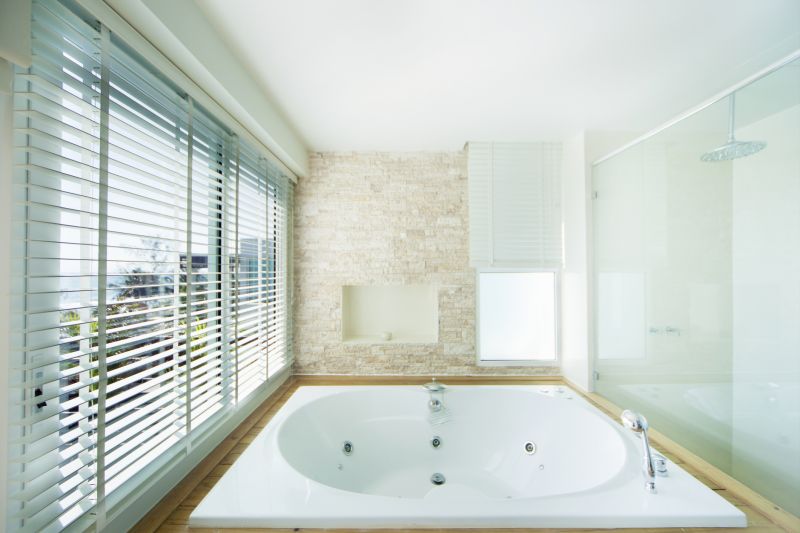Expert Picks Of Bathtub Refinishings Products For Easy Renovations
Choose from trusted products that simplify the refinishing process while delivering lasting, beautiful results.
 Bathtub refinishing is a practical solution for revitalizing worn or outdated tubs, offering a fresh appearance without the need for complete replacement. The process involves applying specialized coatings or paints that adhere to the existing surface, providing a smooth, durable finish. This approach can significantly enhance the aesthetic appeal of a bathroom while potentially extending the lifespan of the bathtub.
Bathtub refinishing is a practical solution for revitalizing worn or outdated tubs, offering a fresh appearance without the need for complete replacement. The process involves applying specialized coatings or paints that adhere to the existing surface, providing a smooth, durable finish. This approach can significantly enhance the aesthetic appeal of a bathroom while potentially extending the lifespan of the bathtub.
Top Overall Option
High-Performance Refinishing Coating
This versatile coating is designed to adhere well to various bathtub surfaces, providing a durable, smooth finish. Its formulation offers good resistance to moisture and everyday use, making it suitable for both DIY enthusiasts and professionals. Easy to apply with minimal preparation, it helps achieve a polished look that can extend the life of your bathtub.
Types of Products For Bathtub Refinishings
Epoxy Bathtub Coatings
Epoxy coatings are known for their strong adhesion and durability, creating a hard, glossy surface that resists staining and chipping.
Acrylic Paints for Bathtubs
Acrylic paints are user-friendly options that provide a smooth, matte or semi-gloss finish, suitable for DIY projects.
Urethane-Based Finishes
Urethane finishes offer excellent chemical and moisture resistance, ideal for high-use bathtubs.
Spray-On Refinishing Products
These products allow for quick application with an even coat, reducing brush marks and providing a uniform appearance.
Brush-On Refinishing Kits
Brush-on kits are comprehensive solutions that include primers, paints, and sealers for thorough refinishing.
Refinishing Primer
Primers improve adhesion of the topcoat and help create a smooth, even surface for refinishing.
Sealants and Topcoats
Sealants protect the refinished surface from moisture and staining, enhancing longevity.
Textured Coatings
Textured coatings provide slip resistance and can hide surface imperfections.
Anti-Microbial Coatings
These coatings inhibit mold and mildew growth, maintaining a cleaner surface.
Resurfacing Kits
Complete kits designed for full bathtub resurfacing, including all necessary components.
Industrial-Grade Refinishing Products
Heavy-duty options intended for commercial or high-traffic environments.
Eco-Resistant Coatings
Formulations that resist common bathroom chemicals and cleaning agents.
Quick-Dry Coatings
Products that cure rapidly, reducing downtime between application and use.
Low-VOC Refinishing Products
Options with reduced volatile organic compounds for safer indoor air quality.
Heat-Resistant Coatings
Suitable for tubs exposed to high temperatures or hot water.
Flexible Coatings
Products that accommodate slight surface movements without cracking.
Popular Choices
Widely used for their durability and high resistance to stains and scratches.
Popular among DIYers for ease of use and a variety of finish options.
Favored for quick, even coverage and professional-looking results.
Chosen for their chemical resistance and glossy appearance.
Provide a shiny, mirror-like finish that enhances the look of the bathtub.
Popular for slip resistance and surface concealment.
Increasingly used for their mold and mildew resistant properties.
Preferred for minimizing project downtime.
Growing in popularity due to safety considerations during application.
Complete kits favored for comprehensive refinishing projects.
Selected for commercial or high-traffic applications.
Popular for their resistance to typical bathroom chemicals.
Chosen for tubs exposed to hot water frequently.
Valued for their ability to accommodate surface movement without cracking.
Refinishing products are designed to withstand typical bathroom conditions, including exposure to moisture and cleaning agents. They come in various formulations, such as epoxy coatings, acrylic paints, and urethane-based finishes, each with unique properties suited for different types of tubs and user preferences. Proper preparation and application are crucial to achieving a long-lasting result, often involving cleaning, sanding, and priming before applying the refinishing product.
Choosing the right product depends on factors like the current condition of the bathtub, desired finish, and ease of application. Some products are formulated for DIY projects, offering user-friendly instructions and quick drying times, while others may require professional application for optimal results. Regardless of the choice, selecting high-quality, compatible refinishing products can help ensure a smooth, durable surface that maintains its appearance over time.
When considering refinishing products, it's important to evaluate their compatibility with existing surfaces, drying and curing times, and the level of surface preparation required. Additionally, understanding the safety precautions, such as ventilation and protective gear, can contribute to a successful refinishing project. Proper product selection and application can transform a tired bathtub into a visually appealing feature of the bathroom, enhancing both functionality and style.
Key Buying Considerations
- Compatibility with existing bathtub surface material
- Durability and resistance to stains, scratches, and chipping
- Ease of application, including whether DIY or professional application is preferred
- Drying and curing times to fit project timelines
- Finish options such as gloss, matte, or textured surfaces
- Resistance to moisture and bathroom chemicals
- Safety precautions during application, including ventilation and protective gear
- Level of surface preparation required before application
- Compatibility with existing fixtures and fittings
- Long-term maintenance requirements for the refinished surface
- Availability of complementary products like primers and sealers
- Environmental considerations, such as VOC content
- Cost-effectiveness relative to project scope
- User reviews and product ratings for real-world performance
- Brand reputation and manufacturer support
